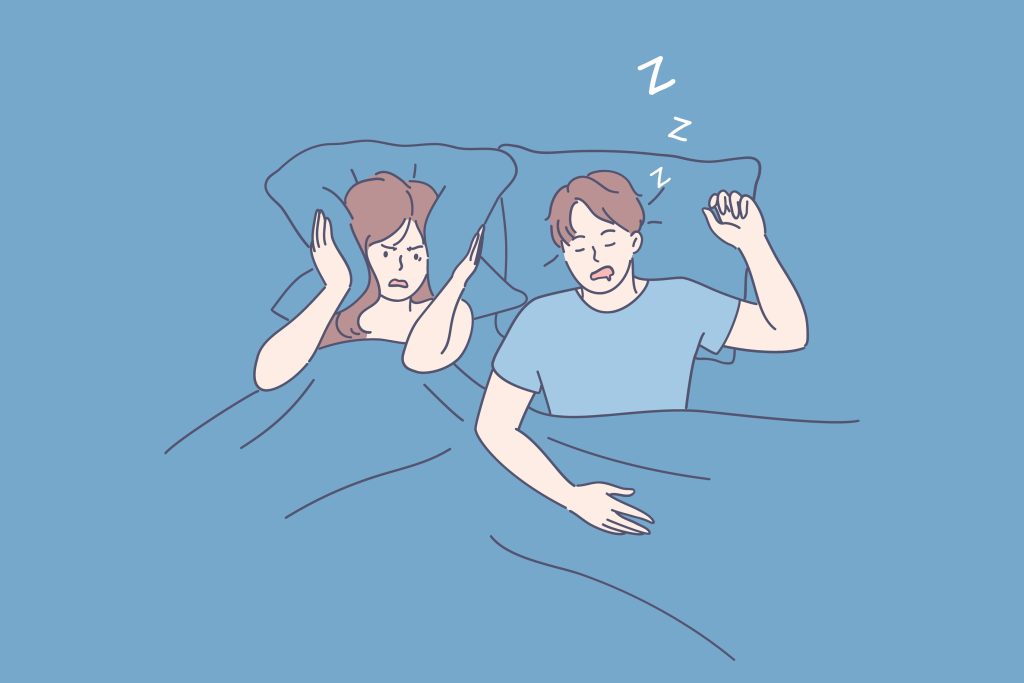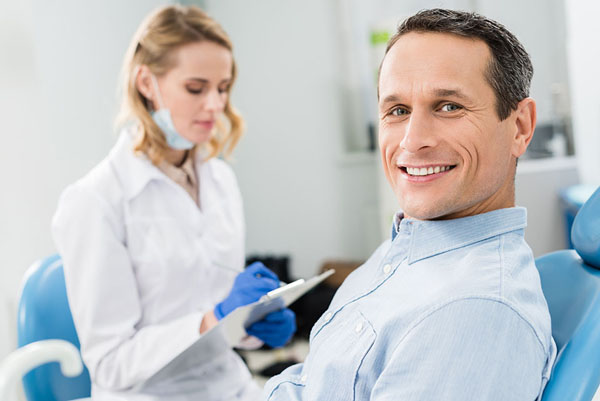Mandibular Advancement Devices for Snoring in Aventura, Pembroke Pines, and Fort Lauderdale, FL

Get the Rest You Deserve with Snoring Solutions from The Dental Care Group
Imagine finally waking up refreshed and energized after a full night’s sleep, free from the constant interruptions of snoring and sleep apnea. While snoring is a common problem affecting more than 80 million people in North America, it can also be a sign of other major health complications. The good news? Mandibular Advancement Devices (MADs) offer a comfortable, effective solution that can make restful sleep a reality for many sleep apnea sufferers.
If you’re curious about oral appliance therapy for sleep apnea and snoring, contact our dental office in Aventura, Pembroke Pines, or Fort Lauderdale to get started. Call our dentist at 305-935-2797 (Aventura), 954-430-2300 (Pembroke Pines), or 954-963-3706 (Fort Lauderdale) to schedule an appointment.
Snoring and Sleep Apnea Solutions at The Dental Care Group
At Dental Care Group, our experienced dentists specialize in non-invasive treatments for snoring and obstructive sleep apnea, helping patients in Aventura, Pembroke Pines, and Fort Lauderdale reclaim restful nights. We offer custom-fitted mandibular advancement devices (MADs)—comfortable oral appliances that gently position the lower jaw forward to open the airway, reducing snoring and improving breathing.
Unlike bulky CPAP machines, our solutions are discreet, easy to wear, and tailored to your unique bite for maximum comfort and effectiveness. With decades of combined expertise, our team addresses related issues like TMJ disorders, which often contribute to sleep disruptions. Patients report noticeable improvements in energy levels and sleep quality within weeks, allowing them to wake up refreshed and ready to enjoy South Florida’s vibrant lifestyle. Schedule a consultation today to explore how our state-of-the-art approach can silence snoring and enhance your overall health.
Common Causes of Snoring
Snoring can result from several factors, including:
- Excess body weight
- Alcohol consumption
- Certain sleep aids or sedatives
- Obstructive Sleep Apnea (OSA)
- Sinus congestion or allergies
- Relaxed throat and mouth muscles during sleep
What is Sleep Apnea?
Sleep apnea is a disorder characterized by breathing pauses during sleep, leading to disrupted sleep quality. These interruptions are caused by obstructions in the upper airway, often due to relaxed muscles and soft tissues in the throat and mouth. When these muscles relax, the air passage becomes smaller, making it harder for each breath to get through. As air moves over the soft tissues, it causes a vibration that results in the snoring sound.
Sleep Apnea Symptoms
Common sleep apnea symptoms include loud snoring, morning headaches, chronic fatigue, and poor concentration. Left untreated, sleep apnea can result in serious health complications such as high blood pressure, heart disease, and stroke. OSA (obstructive sleep apnea) is the most common form of the disorder, affecting not only the quality of sleep of the person who is snoring but also their loved ones and other family members.
What is a Mandibular Advancement Device?
If you snore at night, then a Mandibular Advancement Device (MAD) may represent a snoring solution and a better night’s sleep. MADs are custom-made oral appliances designed to treat mild to moderate sleep apnea, snoring, and teeth grinding by expanding the airway through a forward movement of the jaw.
The MAD is a specially designed dental device that gently helps keep the lower jaw, or mandible, in a forward position, increasing the space between the airway passage and helping you breathe better so you can get a full, quiet night’s sleep. Some devices also stop the tongue from falling back over your windpipe. Your dentist will fit these special appliances to meet your individual condition.
Available in both custom and semi-custom designs, MADs are a popular sleep apnea treatment option that offers a valuable alternative to CPAP machines and other treatment methods.

Benefits of Mandibular Advancement Devices
Patients can experience various benefits with a custom MAD, including:
Non-Invasive Treatment
MADs don’t require surgery or invasive procedures, making them a less intimidating treatment option compared to surgical interventions.
Improved Compliance
Many patients find MADs more comfortable and easier to use compared to CPAP (continuous positive airway pressure) machines. The device does not prevent you from breathing with your mouth open and will even eliminate snoring for patients with sinus congestion or allergies.
Portability and Convenience
MADs are compact and don’t rely on electricity, making them suitable for travel and use in various settings. You can take them anywhere without worrying about power sources or bulky equipment.
Comfortable Design
A mandibular advancement device is made to be comfortable, so that you can sleep without even noticing you’re wearing it. While you may experience some slight stiffness of the jaw for the first few mornings after wearing the device, this feeling is only temporary and will go away after you wake up and remove the device.

Ideal Candidates for MAD Therapy
MADs are generally effective for individuals with specific characteristics and conditions. Ideal candidates often include those who have:
Mild to Moderate OSA
MADs are typically recommended for individuals with mild to moderate OSA. These individuals experience fewer apnea and hypopnea events during sleep compared to those with severe OSA. If you have been diagnosed with mild to moderate OSA, MADs may be a suitable treatment choice.
Intolerance to CPAP Therapy
CPAP therapy is a common alternative for treating OSA. However, some individuals find it uncomfortable or struggle with compliance due to the mask and air pressure. If you can’t tolerate CPAP therapy or prefer a non-invasive option, MADs may be a good alternative.
Preference for Non-Invasive Solutions
MADs are non-invasive and don’t require surgery or other invasive procedures. If you’re looking for a treatment option that doesn’t involve medical interventions or machines, MADs are worth considering.
Anatomical Suitability
Successful use of MADs often depends on the anatomy of your oral cavity and jaw. Ideal candidates have a jaw and tongue structure that allows for the repositioning required by MADs.
Good Dental Health
MADs can impact dental health, particularly bite alignment. Ideal candidates have good dental health and are committed to maintaining it through regular dental check-ups and proper device care.
No Central Sleep Apnea
MADs are primarily designed for obstructive sleep apnea (OSA), which results from physical obstructions in the airway. They’re generally not effective for central sleep apnea, a type of sleep apnea not related to airway obstruction.
The Process for Getting Your MAD
When looking for MADs as a treatment option at The Dental Care Group, patients can expect the following process:
Consultation
Our dentists at The Dental Care Group have experience in sleep medicine and will determine if MADs are suitable for you. They’ll perform a physical examination, which may include an assessment of your oral anatomy. This examination helps determine if you’re a suitable candidate for MAD therapy.
Customization and Fitting
MADs are not one-size-fits-all; they must be tailored to your mouth’s unique shape and size. Our dental professional will take impressions or digital scans of your teeth and oral structures. Using these impressions, the MAD will be fabricated to ensure a comfortable and secure fit in your mouth. Proper fit is essential to optimize the device’s effectiveness and minimize potential side effects.
Follow-Up Appointments
Regular follow-up appointments are essential to monitor device effectiveness and make any necessary adjustments. Our team is committed to ensuring your comfort and the success of your treatment.
Side Effects and Adjustment Period
Potential side effects come hand in hand with any medical treatment, including MADs. Common side effects of oral appliances include:
Dry Mouth
One of the most frequently reported side effects of MADs is dry mouth. This occurs because the device repositions the lower jaw, which can lead to increased airflow through the mouth, potentially causing dryness. Staying well-hydrated and using a humidifier in your bedroom can help alleviate this issue.
Excessive Salivation
Some individuals experience increased salivation when wearing MADs. This is usually a temporary issue as your body adapts to the device. Over time, salivation tends to normalize for most users.
Jaw Discomfort
MADs work by repositioning the lower jaw, and this change in jaw position can lead to temporary discomfort or soreness. You may experience some slight stiffness of the jaw for the first few mornings after wearing the device, but this feeling is only temporary and will go away after you wake up and remove the device. This discomfort typically occurs during the initial adjustment period and may improve with time.
Dental Changes
Long-term use of MADs can, in some cases, lead to minor dental changes or alterations in bite alignment. Regular dental check-ups are important to monitor and address any potential issues.
Tongue Discomfort
Occasionally, individuals may experience mild tongue discomfort or soreness due to the position of the tongue within the device. This, too, usually diminishes as your body adapts to the MAD.
When it comes to adjusting to your dental device, it can take a few weeks. During the first few nights of wearing your appliance, you may experience some initial discomfort, particularly in the jaw area. This discomfort is usually temporary and tends to improve as your muscles adapt to the new jaw position.
If you’re having trouble adjusting to your appliance, contact our dentist as soon as possible for an evaluation.
Caring for Your MAD
To clean your MAD, use a soft toothbrush and mild, non-abrasive toothpaste. Gently scrub the device, paying attention to all surfaces, including the inner and outer parts. Rinse it thoroughly with cold water before using it again. It’s recommended to clean your MAD every morning after use to maintain proper hygiene and extend the life of your device.
Snoring Treatment Cost Considerations
When receiving a MAD, patients can expect to spend between $500 and $2,000, depending on various factors. These factors include:
Type of MAD
There are different types of MADs available, ranging from standard, over-the-counter devices to custom-made, prescription MADs. Custom-made MADs, which are fabricated to fit your mouth precisely, are generally more expensive than generic, non-customized options.
Insurance Coverage
Some health insurance plans may cover a portion of the costs associated with MADs. Coverage varies widely among insurance providers and plans. Check with your insurance company to determine whether MADs are covered and what portion of the costs you may be responsible for.
Replacement and Maintenance Costs
MADs have a lifespan, and they may need replacement over time. Additionally, you should budget for maintenance costs, such as cleaning supplies and any necessary repairs.
To get an accurate estimate for your individual situation, contact our dental office today for an appointment.

Frequently Asked Questions
Do mandibular advancement devices work?
Mandibular advancement devices are effective in treating snoring and obstructive sleep apnea, with minimal side effects and a cost-effective nature. However, not everyone finds them to be successful. The best way to determine if a MAD is right for you is to schedule a consultation with our experienced dentists.
Is a MAD comfortable?
The answer is simple — YES! A mandibular advancement device is made to be comfortable, so that you can sleep without even noticing you’re wearing it. It does not prevent you from breathing with your mouth open and will even eliminate snoring for patients with sinus congestion or allergies.
How do I clean my MAD?
To clean your MAD, use a soft toothbrush and mild, non-abrasive toothpaste. Gently scrub the device, paying attention to all surfaces, including the inner and outer parts. Rinse it thoroughly with cold water before using it again. It’s recommended to clean your MAD every morning after use.
2797 NE 207th Street, Suite 100 Aventura, FL 33180 | (305) 935-2797
12634 Pines Blvd. Pembroke Pines, FL 33027 | (954) 430-2300
3107 Stirling Rd #108 Fort Lauderdale, FL 33027 | (954) 963-3706
Sleep Better and Feel Better with The Dental Care Group!
Custom oral appliances offer a promising solution for individuals suffering from sleep apnea and snoring. With a variety of customization options and proven effectiveness in reducing symptoms, MADs provide a valuable alternative treatment to other treatment options, such as CPAP and lifestyle modifications.
As you consider your options for treating sleep apnea, remember that the right treatment choice is unique to your individual needs and preferences. Our experienced team at The Dental Care Group is here to help you find the solution that works best for you.
To learn more about mandibular advancement devices and schedule an appointment with our dentists in Aventura, Pembroke Pines, or Fort Lauderdale, call us today at 305-935-2797 (Aventura), 954-430-2300 (Pembroke Pines), or 954-963-3706 (Fort Lauderdale). Let us help you achieve the restful, rejuvenating sleep you deserve!

